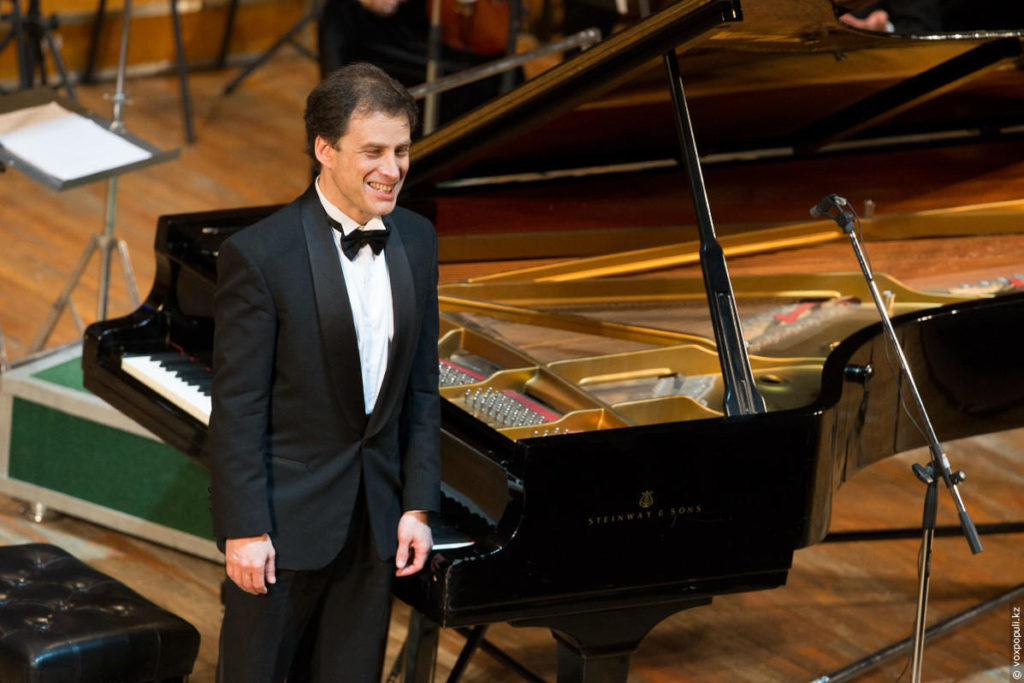~ By Ethan Sadoian ~
Pianist Dmitri Novgorodsky will join the Connecticut Virtuosi Chamber Orchestra for performances of Felix Mendelssohn’s ‘Concerto for Piano, Violin, and Strings in D Minor’ in New Britain and Hartford later this month.
Novgorodsky originally came to the United States nearly 25 years ago for his graduate studies at Yale. He has since enjoyed a career concertizing worldwide and serving as piano faculty at numerous colleges and universities, most recently Ithaca College.
The concerts this month will be Novgorodsky’s third time performing with the CT Virtuosi, having previously been featured as soloist in concerts in 2001 and 2005. “I’m very enthusiastic in looking forward to this opportunity to reconnect with the group and with [Virtuosi artistic director Adrian Sylveen], who is the longtime, relentless, irreplaceable leader, enthusiastic and vibrant, and I love him to death!” Novgorodsky says with a laugh. Novgorodsky, whose association with Sylveen goes back to their time as graduate students at Yale, has fond memories of his previous performances with the Virtuosi: “I remember that some people who came up after the performances [in 2001] actually emphasized how proud they were that a group of this level was enriching the lives of their communities, and that they had the honor, the opportunity to come and to be engaged and involved in experiencing music with them.”
The featured performance on the program will be Mendelssohn’s ‘Concerto for Piano, Violin and Strings,’ which Mendelssohn composed when he was just 14 years old. “In the case of Mendelssohn, some of his best masterpieces were written when he was relatively younger. That’s not to cast any shadow on his later output, but when he was 14 he was already writing pieces that some composers could never come up with for the rest of their lives, and that testifies both to his precociousness, and to the amazing quality of his talent,” Novgorodsky says. “There are lots of scales, lots of arpeggios in virtuosic passages in the fast writing that he does. On the other hand the lyrical subjects, the second subjects in the outer movements and the slow central movement, are incredibly operatic and song-like. Maybe it betrays his infatuation with Italian opera from the 19th century … they could be sung with words, with Italian words. So they are quite different from the fast sections, very melodious and tuneful, very masterful and very inspired writing.”
“Definitely it has a very fresh character … but in general it’s very much Mendelssohn, very much the sparkle of ‘A Midsummer Night’s Dream’, and always very virtuosic. It sounds very fresh and optimistic … and it’s a lot of fun to play,” says Virtuosi concertmaster Brunilda Myftaraj. Myftaraj, who has been involved with the Virtuosi going back 18 years, will join Novgorodsky as the second soloist, performing the violin solo for this double concerto. Two soloists with orchestra provides a somewhat different experience compared to a solo concerto, for both the performers and the audience: “It’s more chamber music rather than solo. Solo is a little bit more technically challenging than the double concerto, because now the responsibilities are spread between the two players instead of just one,” Myftaraj continues.
Novgorodsky concurs with the comparison to chamber music: “I think that with any concerto performance, of course there is a soloist who is kind of set off against the larger group of players. But on the other hand, it’s sort of chamber music … you have to be very sensitive and very collaborative with what the conductor does and what the orchestra does. It’s always a sort of textural interplay and emotional interplay between them and the soloist. So, when there are two instruments in question, it makes it even more chamber music, and I think in a way more exciting. I think it takes the two soloists to really be together, to know what the other person is going to do … it’s more exciting and more challenging, and requires more calculated spontaneity because two people are doing it.”
The concert program will also feature Sir Edward Elgar’s ‘Serenade for Strings in E Minor, Op. 20.’ The Virtuosi frequently features music by Polish composers on its programs, and this concert is no exception, including composer Jakub Kowalewski’s ‘Przypływy-odpływy’ for string orchestra.
This 20th Anniversary Season is a time to highlight the Virtuosi’s contributions to the local musical community. As a guest artist now making his third appearance with the organization, Novgorodsky says it’s impossible to overstate the positive impact the CT Virtuosi has made on our local music community: “I think it’s absolutely inestimable, it’s invaluable. When it was still in its very early days, when I first performed with them, it was still very enthusiastically received, and a huge event in the life of the communities where they played. And I think in all these years, they keep upholding the same standards and traditions. They are all musicians of the highest level … I think the orchestra is a tremendous ‘decoration,’ so to say, to the community and to wherever they play!”
